|
|
|
Sort Order |
|
|
|
Items / Page
|
|
|
|
|
|
|
| Srl | Item |
| 1 |
ID:
088186


|
|
|
|
|
| Publication |
2008-09.
|
| Summary/Abstract |
One of the most important lessons we have learned from the 60-year Palestinian-Israeli conflict is that the essence of the struggle has not changed: It is the expulsion of the people of Palestine from their homes and the confiscation of their land. Since then the Palestinian refugees have been dispersed all over the world, many of them living in deplorable conditions in exile, others suffering under occupation or virtual siege, harassed by friend and foe alike. The implementation of their inalienable rights is the key to a permanent peace. All else, including a Palestinian state, so-called regional cooperation or other contrived devices to obscure this fundamental issue, is peripheral. In addition, the misrepresentation of the Right of Return by Israel and its defenders, the United States in particular, is driven more by fear about, rather than interest in, their rights. However, the refugees issue is still the main problem to contend with and is imposing itself on every agenda of negotiating the question of Palestine.1 This article will propose a practical and reasonable solution for the refugees to exercise their right to return to their homes.
|
|
|
|
|
|
|
|
|
|
|
|
|
|
|
|
| 2 |
ID:
088188
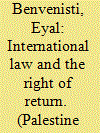

|
|
|
| 3 |
ID:
164744
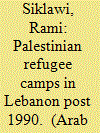

|
|
|
|
|
| Summary/Abstract |
This article addresses the issue of the Palestinian refugees in Lebanon, their camps, their resistance, and the challenges they have been facing “as refugees” to survive in the deeply divided state of Lebanon and to return to Palestine. Currently there are about 450,000 Palestinian refugees scattered among 12 official and recognized Palestinian refugee camps in Lebanon as well as many refugee gatherings; this number is part of the 6 million Palestinian refugees who are scattered in the world as a result of the establishment of the Zionist entity in 1948. However, on December 11, 1948, the United Nations General Assembly issued the UN resolution 194, during its third session, which stipulated that Palestinians have the right of return to their homes in Palestine. The Palestinian right of return is a Right and therefore it is not negotiable and cannot be compromised under any condition and/or circumstance. There have been continual attempts and proposals to terminate this Palestinian right of return to historic Palestine. To stop these toxic proposals from reaching their goals and to achieve their strategic goal, the Palestinian resistance has the legitimate right to use any means necessary, including armed struggle against the occupiers. The Palestinians in Lebanon are part of this process and they have been struggling on all levels to achieve their civil and human rights in order to improve their social and economic conditions in their refugee camps. Furthermore, the Palestinians have the legitimate right to continue their national struggle against Israel, which is the only way for the Palestinians to achieve their national goal for total liberation. However, there have been additional challenges affecting the Palestinians and their refugee camps in Lebanon post 1990; by the end of the Lebanese Civil War, the Palestinian refugee camps witnessed the emergence and growth of takfiri groups. Consequently, the Palestinian refugees have been sandwiched between oppressive Lebanese rules and the rise of the takfiris inside the camps. The article attempts to answer the following questions: What are the challenges affecting the Palestinian refugees in Lebanon? How can the Palestinians protect their identity from erasure and achieve their right of return to Palestine? Which internal and external groups currently control the camps? In what ways has takfiri ideology impacted the Palestinian identity? How can the Palestinian refugees and their camps survive under such conditions?
|
|
|
|
|
|
|
|
|
|
|
|
|
|
|
|
| 4 |
ID:
191437
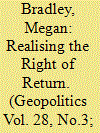

|
|
|
|
|
| Summary/Abstract |
Refugee repatriation rests on a fundamental norm: the right of return. The Office of the UN High Commissioner for Refugees (UNHCR) styles itself as the chief defender of international norms on refugees, educating refugees about their rights and socialising states to respect the cardinal rules of the refugee regime. However, UNHCR initially devoted little attention to the right of return. When UNHCR began to engage more actively with repatriation in the 1980s, it had only a nascent institutional conceptualisation of the right of return: it framed the implementation of the right of return as a non-political, humanitarian undertaking, and assumed sovereign states had largely unfettered discretion in its implementation. Drawing on extensive material from the UNHCR archives on repatriation movements from Honduras to El Salvador in the 1980s, this article examines how refugees themselves have influenced the governance of return by serving as norm entrepreneurs, localising the right of return and socialising UNHCR to rethink and support broader interpretations of this principle. It analyzes how Salvadoran refugees envisioned the right of return as a collective and deeply political process of asserting citizenship claims, and took direct action to implement this right, compelling UNHCR and government actors to adjust to their vision. These experiences have important implications for understandings of the right of return as an international norm, and the roles of refugees themselves as actors in norm localisation and socialisation processes. Reinforcing and expanding on recent studies of how refugees actively shape aid efforts, peacebuilding and the resolution of displacement, this study highlights the significance of subaltern power in the refugee regime, showing how it can reverberate across different sites and scales to definitively influence not only the execution of the regime’s core functions but also the interpretation of the normative commitments underpinning it.
|
|
|
|
|
|
|
|
|
|
|
|
|
|
|
|
| 5 |
ID:
139682
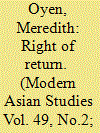

|
|
|
|
|
| Summary/Abstract |
This article examines the rise of the international refugee regime in Asia, focusing on the work of the International Refugee Organization in repatriating overseas Chinese from mainland China back to their homes in Southeast Asia from 1947 to 1956. It looks both at how the International Refugee Organization inherited this repatriation project from its predecessor—the United Nations Relief and Rehabilitation Administration—and its survival after a civil war installed a new, Communist government on the Chinese mainland. Doing so reveals the extent to which both Chinese governments had to rely on outside assistance to fulfil an important task of maintaining positive ties between Chinese abroad and the homeland. Using research from the Ministry of Foreign Affairs archives in Beijing and Taipei, as well as records from relevant parties in the British and American governments, this article places the repatriation programme and the larger efforts of the International Refugee Organization in Asia in a broader context of regional foreign relations and the origins of the Cold War.
|
|
|
|
|
|
|
|
|
|
|
|
|
|
|
|
| 6 |
ID:
145605


|
|
|
|
|
| Summary/Abstract |
This article argues that Israel substituted the Palestinian refugees’ internationally recognized right of return with a family reunification program during its maneuvering over admission at the United Nations following the creation of the state in May 1948. Israel was granted UN membership in 1949 on the understanding that it would have to comply with legal international requirements to ensure the return of a substantial number of the 750,000 Palestinians dispossessed in the process of establishing the Zionist state, as well as citizenship there as a successor state. However, once the coveted UN membership had been obtained, and armistice agreements signed with neighboring countries, Israel parlayed this commitment into the much vaguer family reunification program, which it proceeded to apply with Kafkaesque absurdity over the next fifty years. As a result, Palestinians made refugees first in 1948, and later in 1967, continue to be deprived of their legally recognized right to return to their homes and their homeland, and the family reunification program remains the unfulfilled promise of the early years of Israeli statehood.
|
|
|
|
|
|
|
|
|
|
|
|
|
|
|
|
| 7 |
ID:
113986
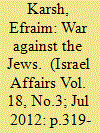

|
|
|
|
|
| Publication |
2012.
|
| Summary/Abstract |
The sustained anti-Israel de-legitimization campaign is a corollary of the millenarian obsession with the Jews in the Christian and the Muslim worlds. Since Israel is the world's only Jewish state, and since Zionism is the Jewish people's national liberation movement, anti-Zionism - as opposed to criticism of specific Israeli policies or actions - means denial of the Jewish right to national self-determination. Such a discriminatory denial of this basic right to only one nation (and one of the few that can trace their corporate identity and territorial attachment to antiquity) while allowing it to all other groups and communities, however new and tenuous their claim to nationhood, is pure and unadulterated anti-Jewish racism, or anti-Semitism as it is commonly known.
|
|
|
|
|
|
|
|
|
|
|
|
|
|
|
|
|
|
|
|
|